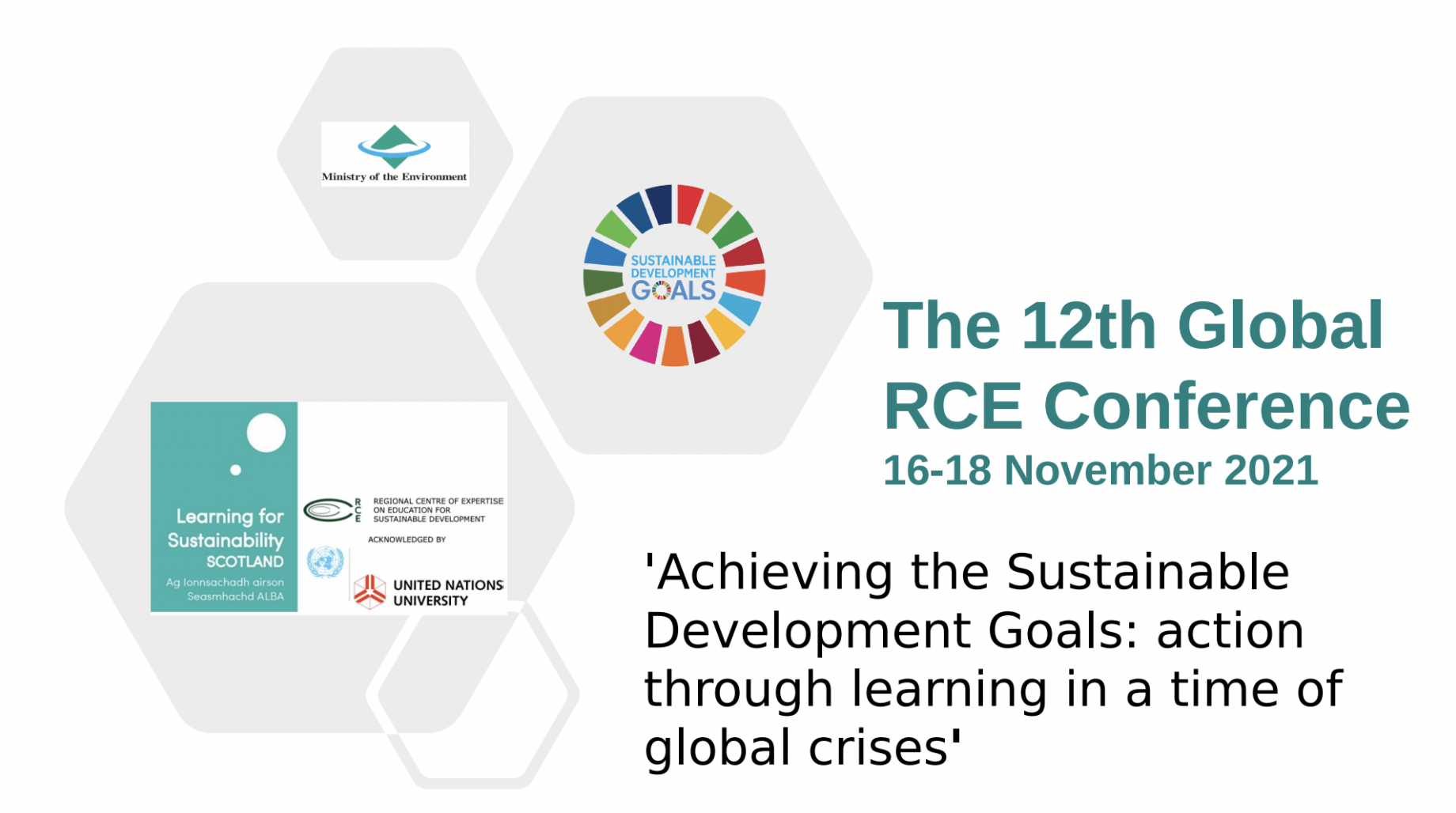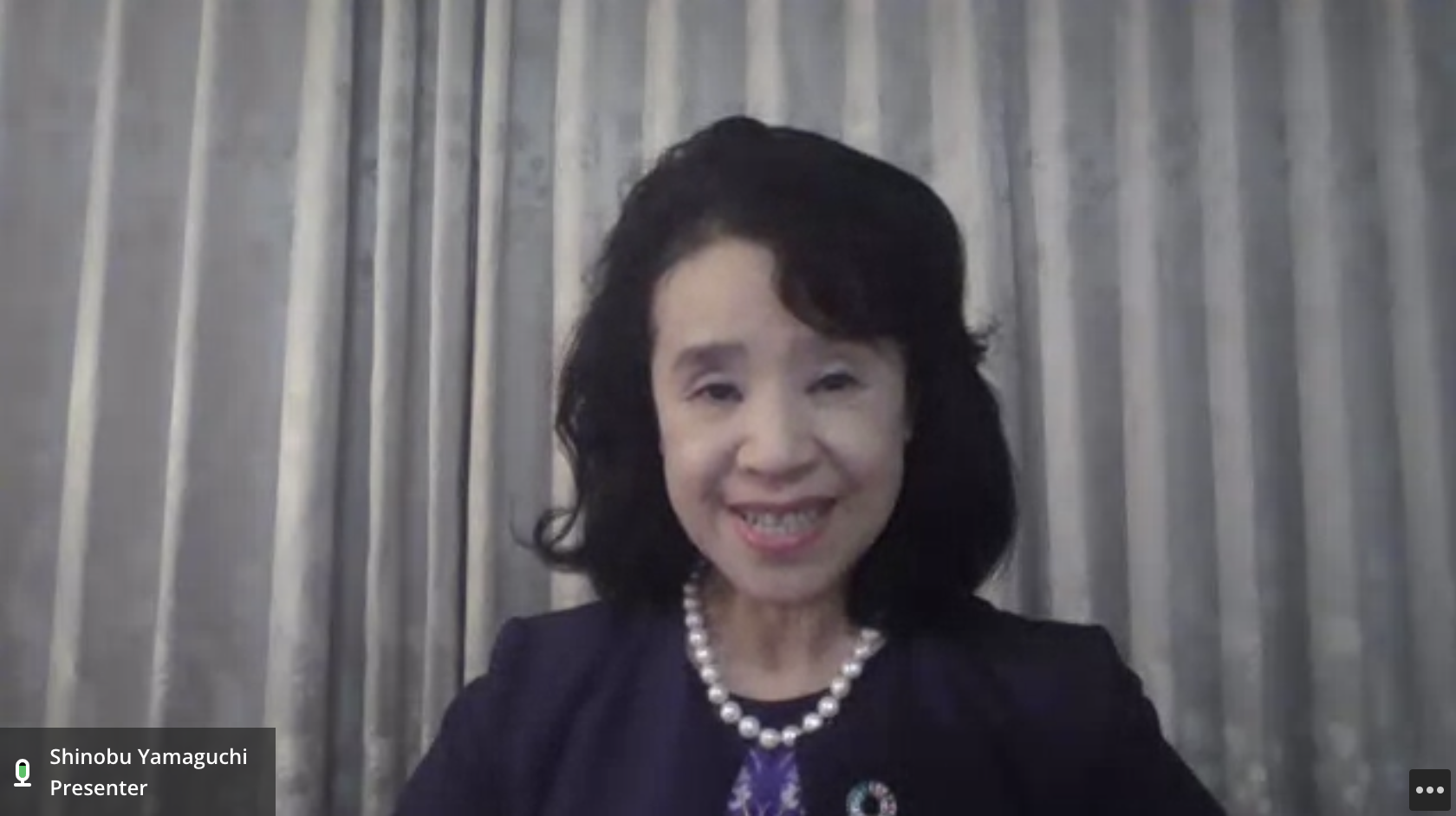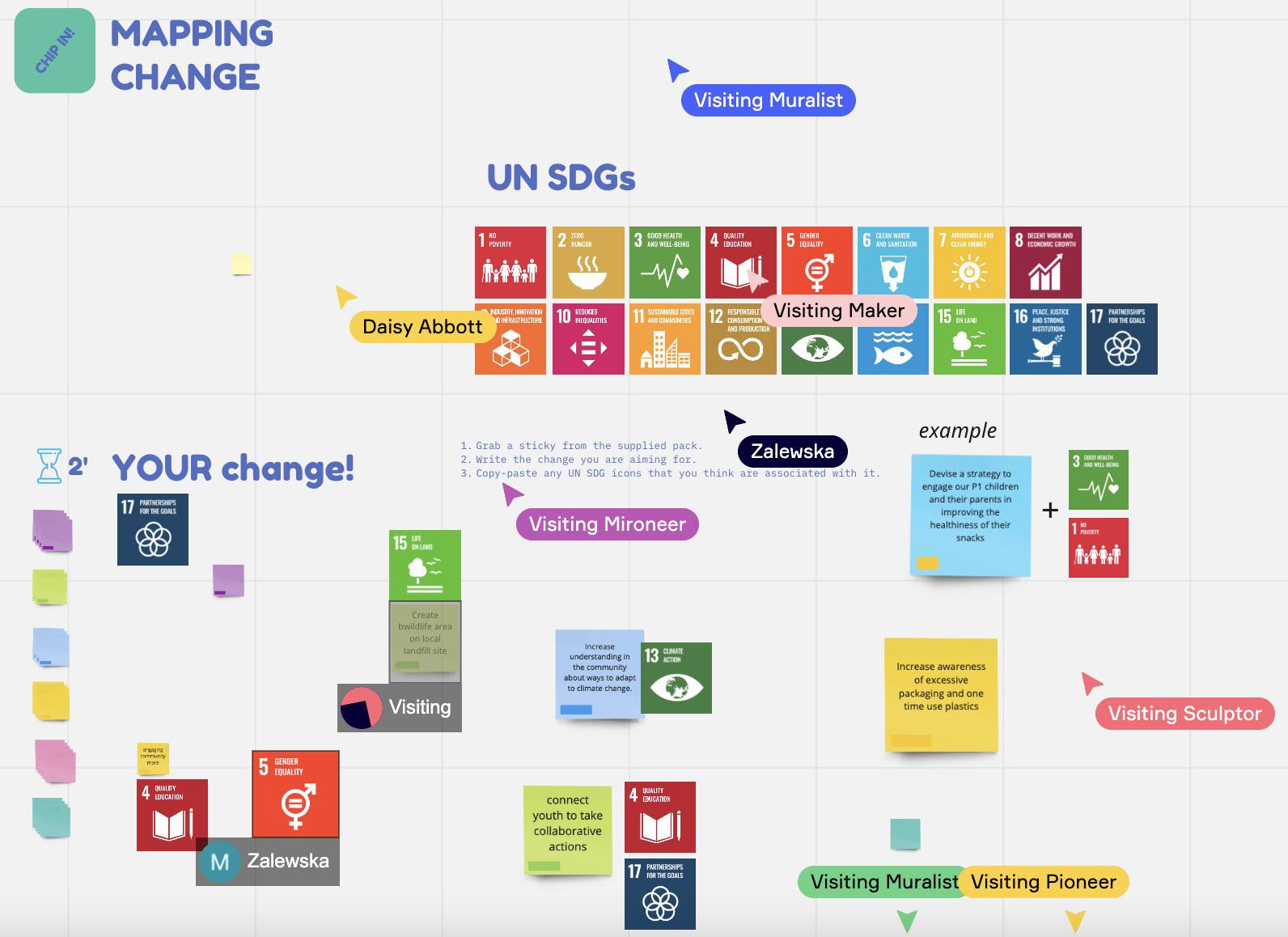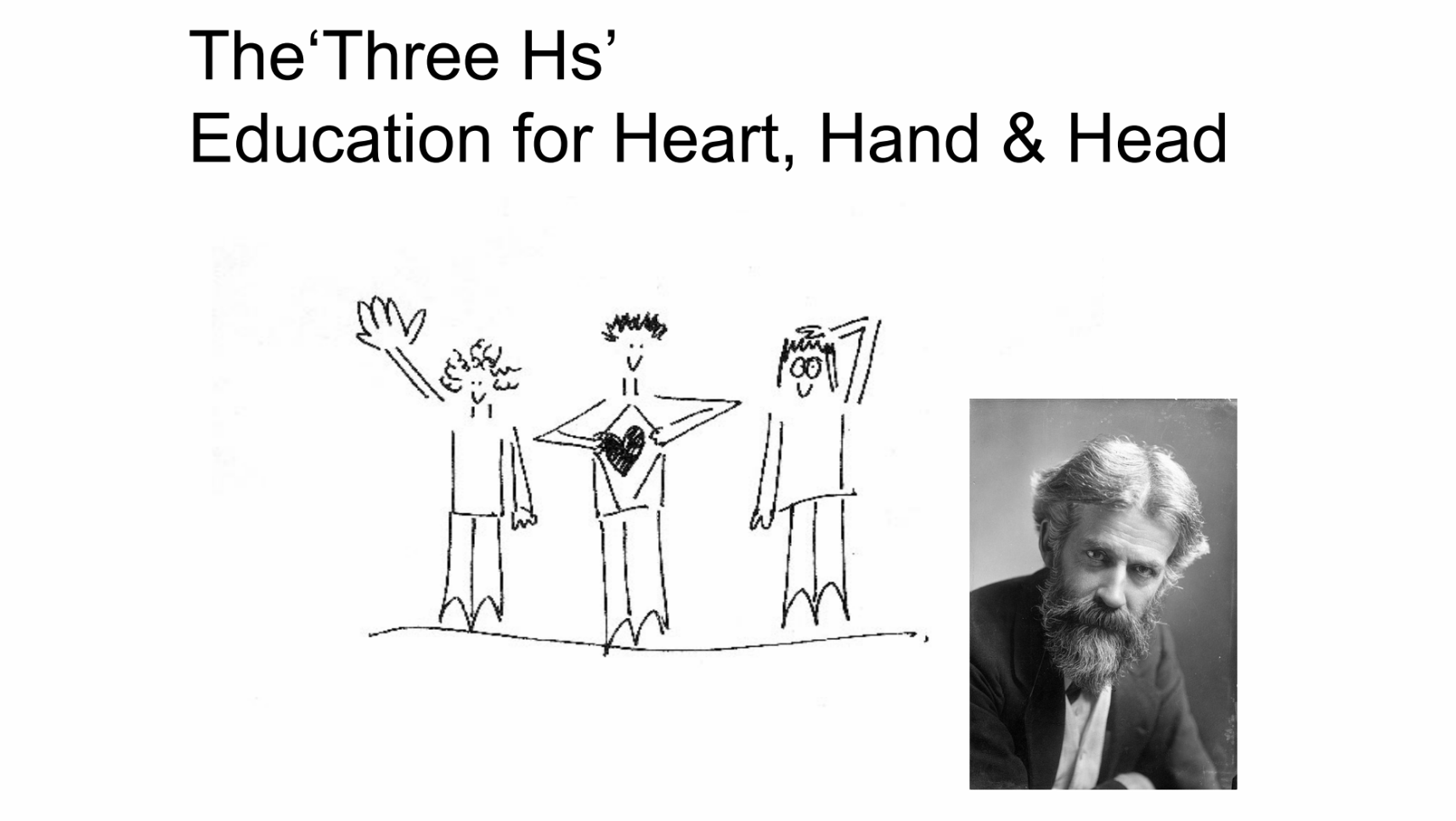RCEs Come Together to Focus on Strengthening Action on Global Crises through the 'Heart', 'Head', and 'Hands'
 Key points:
Key points:- From 16-18 November, 2021, 351 attendees from across the Global RCE Network gathered online for the 12th Global RCE Conference (hosted by RCE Scotland and the Global RCE Service Centre) to explore action through learning in a time of global crises.
- Across the three days, participants explored sub-themes of 'Hearts', 'Hands', and 'Heads', a concept by Scottish 19th century polymath and educational visionary Sir Patrick Geddes (1854 -1932).
- The programme consisted of keynotes, panel discussions, parallel sessions and workshops to enable RCEs to collaborate, share, and celebrate good practices.
- Participants explored how to strengthen action on the UNESCO ESD for 2030 framework, SDGs, and RCE Roadmap beyond COP26.
The 12th Global RCE Conference was held online from 16-18 November, 2021, hosted by RCE Scotland the Global RCE Service Centre under the theme 'Achieving the Sustainable Development Goals: action through learning in a time of global crises'.
Across three days, 351 attendees from across the network explored the sub-themes of ‘Hearts’ (What kind of world do we want? How do we engage hearts and minds?), ‘Heads’ (Visioning, thinking and reflecting: planning for action on Education for Sustainable Development and the Sustainable Development Goals), and ‘Hands’ (Making it happen: taking action on Education for Sustainable Development and the Sustainable Development Goals).
 Opening the Conference, Prof. Shinobu Yume Yamaguchi (Director, UNU-IAS), welcomed participants, acknowledging the unique nature of RCEs as powerful mechanisms to translate the global agenda into local actions through multi-stakeholder partnerships, and as platforms for collaboration. The launch of the new RCE Roadmap this year has also set the direction and strategy for the network over the next 10 years, to make education a vital mechanism for sustainable development. Shirley-Anne Somerville, (Cabinet Secretary for Education and Skills, Scottish Parliament), also noted RCEs’ ideal position to implement action at the local level and their ability to translate existing knowledge into concrete actions and empower individuals to make sustainable decisions for themselves and communities. Kensuke Asahara (Senior Assistant for Policy Planning of the Environmental Education, The Ministry of the Environment, Japan) stressed the necessity of international collaboration to tackle issues such as climate change and biodiversity conservation, and the importance of fostering local leaders who can contribute to solving issues in communities.
Opening the Conference, Prof. Shinobu Yume Yamaguchi (Director, UNU-IAS), welcomed participants, acknowledging the unique nature of RCEs as powerful mechanisms to translate the global agenda into local actions through multi-stakeholder partnerships, and as platforms for collaboration. The launch of the new RCE Roadmap this year has also set the direction and strategy for the network over the next 10 years, to make education a vital mechanism for sustainable development. Shirley-Anne Somerville, (Cabinet Secretary for Education and Skills, Scottish Parliament), also noted RCEs’ ideal position to implement action at the local level and their ability to translate existing knowledge into concrete actions and empower individuals to make sustainable decisions for themselves and communities. Kensuke Asahara (Senior Assistant for Policy Planning of the Environmental Education, The Ministry of the Environment, Japan) stressed the necessity of international collaboration to tackle issues such as climate change and biodiversity conservation, and the importance of fostering local leaders who can contribute to solving issues in communities.
Chaired by Dr. Rehema White (Chair, RCE Scotland), in opening day 1 she explained the day’s focus as hope for the future, and the ideas from Sir. Patrick Geddes, of engaging with the ‘heart’, ‘head’, and ‘hands’. This first day started with ‘heart’ and the emotions and motivations for the actions we wish to take, in order to engage learners to feel. In the welcome from the Global RCE Service Centre, Dr. Philip Vaughter (Research Consultant, UNU-IAS) noted the impressive range of projects RCEs have been undertaking over the past year, evidenced by projects which have demonstrated behavioural change pedagogies and applied learning, despite challenging conditions amid the pandemic.
 The keynote on the first day, ‘Education for Sustainable Development: A more place-responsive approach?’ was presented by Dr. Gregory Mannion (Senior Lecturer in Education, University of Stirling). In his talk, Dr. Mannion spoke about place-responsive pedagogy, which can shape learning experiences and connect learners to communities near and far. He spoke about the importance of needing to relate differently to places, which can play a strong role in engaging learners, and through education, encourage people to be responsive to the land or places in which they live.
The keynote on the first day, ‘Education for Sustainable Development: A more place-responsive approach?’ was presented by Dr. Gregory Mannion (Senior Lecturer in Education, University of Stirling). In his talk, Dr. Mannion spoke about place-responsive pedagogy, which can shape learning experiences and connect learners to communities near and far. He spoke about the importance of needing to relate differently to places, which can play a strong role in engaging learners, and through education, encourage people to be responsive to the land or places in which they live.
In the panel session on Day 1 chaired by Dr. Rehema White, the panel reflected on the theme of ‘Hearts’. Kate Sposab (RCE Belarus) underlined the importance as educators, of continuing their vital work as well as developing ideas on how to sustain motivation. In discussing how to engage with learners and support actions, Dr. Gregory Mannion highlighted the need for community-based solidarity across generational boundaries, to spur action across generations. Post-COP26, looking to how we can inspire and support values in young people and others for actions, Junayeed Matin (RCE Okayama) stressed the importance of youth taking into their own hands the actions that were talked about at COP26, and how crucial it is to continue educating the youth and empowering them with the tools and knowledge to tackle these urgent issues.
 After the first day of focusing on ‘Hearts’ and how to inspire others, the second day focused on ideas, theories, practical strategies and resources under the theme of ‘Heads’. The day began with a presentation by Shannon Kobran (Lead, SDG Academy Kuala Lumpur, UN Sustainable Development Solutions Network), who provided an overview of the ESD resources the SDG Academy offers, including a range of MOOCs and SDG Academy Library – a searchable content repository of video lectures and case studies on sustainable development – valuable resources for the Global RCE Network. This was followed by a presentation by Christina Drews and Mo Wang (Programme Specialists, UNESCO Institute for Lifelong Learning), who presented on ‘Implementing ESD in Learning Cities’, looking at how to implement ESD at the local level and explaining how the UNESCO Global Network of Learning Cities (GNLC) and RCEs can leverage opportunities for collaboration, given the GNLC’s mission to support and improve lifelong learning in the world’s cities.
After the first day of focusing on ‘Hearts’ and how to inspire others, the second day focused on ideas, theories, practical strategies and resources under the theme of ‘Heads’. The day began with a presentation by Shannon Kobran (Lead, SDG Academy Kuala Lumpur, UN Sustainable Development Solutions Network), who provided an overview of the ESD resources the SDG Academy offers, including a range of MOOCs and SDG Academy Library – a searchable content repository of video lectures and case studies on sustainable development – valuable resources for the Global RCE Network. This was followed by a presentation by Christina Drews and Mo Wang (Programme Specialists, UNESCO Institute for Lifelong Learning), who presented on ‘Implementing ESD in Learning Cities’, looking at how to implement ESD at the local level and explaining how the UNESCO Global Network of Learning Cities (GNLC) and RCEs can leverage opportunities for collaboration, given the GNLC’s mission to support and improve lifelong learning in the world’s cities.
 The third day covered the theme of ‘Hands’ and how to take action on the SDGs. Beginning with an update from the Global RCE Service Centre, Dr. Philip Vaughter presented an overview of the network over the past two years since the previous Global RCE Conference, including the growth to 181 members, recognition of 2020 RCE Awards winners, and the many events completed on the road to the 12th Global RCE Conference, including the RCE Global Webinars conducted in February and June of 2021, and the 2020 and 2021 RCE Regional Meetings organised online across four continents. These events allowed for the network to continue sharing experiences and knowledge under the pandemic, and to ensure other priorities related to the achievement of sustainable development continued to be addressed during this period. Publications from the network, including one featuring case studies on climate change was also highlighted, as was the new RCE Roadmap, which will guide the network’s collective actions towards 2030.
The third day covered the theme of ‘Hands’ and how to take action on the SDGs. Beginning with an update from the Global RCE Service Centre, Dr. Philip Vaughter presented an overview of the network over the past two years since the previous Global RCE Conference, including the growth to 181 members, recognition of 2020 RCE Awards winners, and the many events completed on the road to the 12th Global RCE Conference, including the RCE Global Webinars conducted in February and June of 2021, and the 2020 and 2021 RCE Regional Meetings organised online across four continents. These events allowed for the network to continue sharing experiences and knowledge under the pandemic, and to ensure other priorities related to the achievement of sustainable development continued to be addressed during this period. Publications from the network, including one featuring case studies on climate change was also highlighted, as was the new RCE Roadmap, which will guide the network’s collective actions towards 2030.
The keynote for the third day was presented by Lara Freitas (Certified facilitator of Gaia Education), who spoke about the importance of working together in neighbourhoods for regeneration, promoting wellbeing and sense of place, and bringing back cities and neighbourhoods to nature. She highlighted their work on the ‘Econeighbourhood Permanent Program’ in Brazil, which promotes and supports actions to make the neighbourhood more sustainable and peaceful, and the integrative and systemic design that strengthens urban communities under the project.
Over the three days, in Practice Sharing Sessions split by thematic groups, RCEs shared case studies on the following themes: ‘Connecting with Nature’; ‘Stories for Sustainability’; ‘Inspiring and Engaging Civic Society’; ‘Creative, Art-based Approaches’; ‘Strategising and Understanding Systems’; ‘Futures Thinking’; ‘Collaborating Online’; ‘Learning with Nature’; ‘Learning to Build Sustainability’; ‘Partnerships for Action’; and ‘Action for Green, Clean, Peaceful Places’. The range of projects presented covered a range of topics including creative approaches to engaging civic society, working and creating shared visions with local communities, how to inspire young people, and the impact of stories in connecting people with complex issues like climate change.
Participants joined workshops on Days 1 and 2 of the Conference, on a range of areas, some of which included: Circular Economy and its relevance to addressing the climate emergency; engaging communities to talk about the climate crisis, as well as supporting and empowering them to take local actions; highlighting youth work’s contributions to tackling the crisis and how to better engage with them; how to empower grassroots local action for the SDGs; and supporting educators to act as agents of change, and practitioners to integrate the SDGs into teaching and learning.
 In Regional Parallel Sessions on Day 3 of the Conference, participants discussed regional priorities, challenges, and shared best practices. In the Asia-Pacific session, attendees reviewed action plans for 2022 in the context of the RCE Roadmap, SDGs, and ESD for 2030 Framework, including 40 projects from six RCEs submitted to date. Participants also discussed collaboration projects such as a knowledge hub to develop learning cases, and to empower youth by providing mentorship with experts from RCEs via a series of webinars. In the Africa session, participants shared the issues in their communities, including waste management, support and funding, and rural-urban migration. Other challenges expressed included low participation from the region’s RCEs in various events during the pandemic, and the need to reinvigorate the youth network. For the Americas session, the newly founded RCE Americas governance structure was presented, comprising of a Main Steering Committee and Support Committees, as well as four task forces on People, Cities and Prosperity, Planet, and Education & Wellbeing. The structure was created to increase collaboration and cooperation in the Americas network and to ensure efforts are not duplicated across the region. In the European session, participants spoke about how to build on the momentum from COP26, and how RCEs can further engage and involve young people in their activities. The upcoming European Regional Meeting in February 2022 was also discussed, which is currently being co-created with young people, with hopes this is one of many examples to come. The meeting will focus on creativity and how it can be used to work towards the SDGs.
In Regional Parallel Sessions on Day 3 of the Conference, participants discussed regional priorities, challenges, and shared best practices. In the Asia-Pacific session, attendees reviewed action plans for 2022 in the context of the RCE Roadmap, SDGs, and ESD for 2030 Framework, including 40 projects from six RCEs submitted to date. Participants also discussed collaboration projects such as a knowledge hub to develop learning cases, and to empower youth by providing mentorship with experts from RCEs via a series of webinars. In the Africa session, participants shared the issues in their communities, including waste management, support and funding, and rural-urban migration. Other challenges expressed included low participation from the region’s RCEs in various events during the pandemic, and the need to reinvigorate the youth network. For the Americas session, the newly founded RCE Americas governance structure was presented, comprising of a Main Steering Committee and Support Committees, as well as four task forces on People, Cities and Prosperity, Planet, and Education & Wellbeing. The structure was created to increase collaboration and cooperation in the Americas network and to ensure efforts are not duplicated across the region. In the European session, participants spoke about how to build on the momentum from COP26, and how RCEs can further engage and involve young people in their activities. The upcoming European Regional Meeting in February 2022 was also discussed, which is currently being co-created with young people, with hopes this is one of many examples to come. The meeting will focus on creativity and how it can be used to work towards the SDGs.
On the final day of the Conference, winners of both the RCE Youth Climate Art Challenge and the 10th RCE Awards were announced and celebrated. Dr. Jonghwi Park (Head of Innovation and Education Programme, UNU-IAS), presented five awards for the Art Challenge, which saw engagement from youth through a range of artworks responding to the themes of ‘Hearts’, ‘Heads’, and ‘Hands’ as it relates to climate action, to bring awareness to the challenges faced due to climate change. Presented by Dr. Philip Vaughter, the RCE Awards saw 28 awards handed out in total, with submissions received across all SDGs, featuring projects that have effectively engaged across the system, used applied knowledge, and reached and educated local communities.
The event provided participants with the opportunity to both share and celebrate good practices involving action through learning from across the network, and how action towards the ESD for 2030 agenda could be strengthened. In closing, Prof. Peter Higgins (Director, RCE Scotland) stressed the importance of thinking globally and acting locally and engaging with global initiatives, all strengths of the Global RCE Network, demonstrated throughout the Conference in how the RCE community works at these different scales. He noted that by learning together and connecting throughout the network, RCEs can become more effective in sharing good practices and continue to inspire each other, and ultimately, collectively achieve the action needed in this time of global crises.
The Global RCE Service Centre would like to sincerely thank RCE Scotland and its partners for their tireless efforts, dedication and superb organisation working to make the 12th Global RCE Conference a great success! In addition, we would like to thank all speakers and participants for their valuable contributions and active participation for what was an incredible and inspiring three days.
For more information and to access resources from the 12th Global RCE Conference, visit the event page here.


